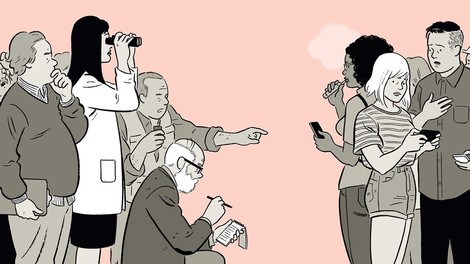Your podcast discovery platform
Curious minds select the most fascinating podcasts from around the world. Discover hand-piqd audio recommendations on your favorite topics.

piqer for: piqd Boom and bust Climate and Environment Global finds Globalization and politics Health and Sanity Technology and society Doing Good Deep Dives
Malia Politzer is the executive editor of piqd.com, and an award-winning long-form journalist based out of Spain. She specializes in reporting on migration, international development, human rights issues and investigative reporting.
Originally from California, she's lived in China, Spain, Mexico and India, and reported from various countries in Africa, Europe and the Middle East. Her primary beats relate to immigration, economics and international development. She has published articles in Huffington Post Highline, The Economist, The Wall Street Journal, Vogue India, Mint, Far Eastern Economic Review, Foreign Policy, Reason Magazine, and the Phoenix New Times. She is also a regular contributor to Devex.
Her Huffington Post Highline series, "The 21st Century Gold Rush" won awards from the National Association of Magazine Editors, Overseas Press Club, and American Society of Newspaper Editors. She's also won multiple awards for feature writing in India and the United States.
Her reporting has been supported by the Pulitzer Center on Crisis Reporting, The Institute For Current World Affairs, and the Global Migration Grant.
Degrees include a BA from Hampshire College and MS from Columbia University Graduate School of Journalism, where was a Stabile Fellow at the Center for Investigative Journalism.
Where Millennials Come From, And Why We Insist On Blaming Them For IT
We've all heard the stereotypes: American millennials are a self-serving, entitled generation who are eschewing the traditional pillars of adulthood (marriage, home ownership, kids) in exchange for a life of "purpose" working poorly-paid jobs with no security, and spending all their money on expensive coffee and $15 smashed avocado toast.
In this long read, New Yorker writer Jia Tolentino puts these stereotypes under the magnifying glass, and shows how in fact many "stereotypical" millennial behaviors are products of the current economic and cultural climate, rather than the cause.
The type of millennial that much of the media flocks to—white, rich, thoughtlessly entitled—is largely unrepresentative of what is, in fact, a diverse and often downwardly mobile group. (Millennials are the first generation to have just a fifty-fifty chance of being financially better off than their parents.) Many millennials grew up poor, went to crummy schools, and have been shuttled toward for-profit colleges and minimum-wage jobs, if not the prison system. (For-profit colleges, which disproportionately serve low-income students, account for roughly a tenth of undergraduates, and more than a third of student-loan defaults.) Average student debt has doubled just within this generation, surging from around eighteen thousand dollars at graduation for the class of 2003 to thirty-seven thousand for the class of 2016.
Young people, she writes, have curled around this economic reality "like vines on a trellis".
What does this mean for the future of the United States? Malcolm Harris, one of the experts quoted in the piece, sees parallels between the economic and cultural challenges facing millennials and the increasingly politically extreme and polarized climate.
Either we continue the trends we’ve been given and enact the bad future, or we refuse and cut the knot of trend lines that defines our collectivity. We become fascists or revolutionaries, one or the other.
